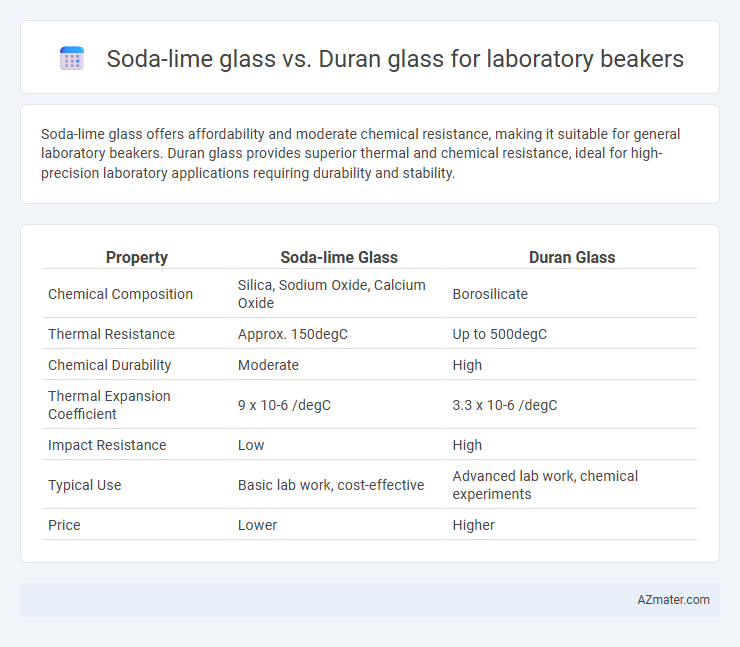Soda-lime glass offers affordability and moderate chemical resistance, making it suitable for general laboratory beakers. Duran glass provides superior thermal and chemical resistance, ideal for high-precision laboratory applications requiring durability and stability.
Table of Comparison
| Property | Soda-lime Glass | Duran Glass |
|---|---|---|
| Chemical Composition | Silica, Sodium Oxide, Calcium Oxide | Borosilicate |
| Thermal Resistance | Approx. 150degC | Up to 500degC |
| Chemical Durability | Moderate | High |
| Thermal Expansion Coefficient | 9 x 10-6 /degC | 3.3 x 10-6 /degC |
| Impact Resistance | Low | High |
| Typical Use | Basic lab work, cost-effective | Advanced lab work, chemical experiments |
| Price | Lower | Higher |
Introduction to Laboratory Glassware
Soda-lime glass, commonly used for general laboratory beakers, offers affordability and adequate chemical resistance for everyday experiments but is less durable under thermal stress compared to Duran glass. Duran glass, a borosilicate glass, is preferred in laboratory glassware for its superior thermal resistance, low thermal expansion, and higher chemical durability, making it ideal for precise and high-temperature applications. Selecting between soda-lime and Duran glass beakers depends on the laboratory requirements for heat tolerance, chemical exposure, and budget considerations.
Overview of Soda-Lime Glass
Soda-lime glass, the most common material for laboratory beakers, consists primarily of silica (about 70-75%), soda (sodium oxide, 12-15%), and lime (calcium oxide, 10-15%), offering cost-effective durability and chemical resistance. It withstands temperatures up to 500degC but is less resistant to thermal shock and certain chemicals compared to borosilicate glass like Duran, which contains higher silica content and boron oxide for enhanced strength. Soda-lime glass is preferred for general lab applications requiring affordability and moderate thermal stability, while Duran is chosen for experiments demanding high chemical resistance and thermal endurance.
Overview of Duran (Borosilicate) Glass
Duran glass, a type of borosilicate glass, exhibits superior thermal resistance and chemical durability compared to soda-lime glass, making it ideal for laboratory beakers exposed to extreme temperature changes and aggressive chemicals. Its low thermal expansion coefficient minimizes the risk of cracking during rapid heating or cooling, enhancing safety and longevity in scientific applications. This glass type withstands high temperatures up to 500degC and resists alkali and acid corrosion, ensuring reliable performance in rigorous laboratory environments.
Chemical Composition Differences
Soda-lime glass primarily consists of silica (SiO2), sodium oxide (Na2O), and calcium oxide (CaO), making it less resistant to thermal shock and chemical corrosion compared to Duran glass. Duran glass, a brand of borosilicate glass, contains a higher proportion of silica (around 80%) and boron oxide (B2O3), which greatly enhances its chemical durability and thermal resistance. This compositional difference makes Duran glass ideal for laboratory beakers requiring exposure to aggressive chemicals and rapid temperature changes.
Thermal Resistance Comparison
Soda-lime glass laboratory beakers typically withstand temperatures up to about 500degC, making them suitable for routine heating but prone to thermal shock and breakage under rapid temperature changes. Duran glass, a borosilicate glass, offers superior thermal resistance up to approximately 600-650degC and exhibits excellent resistance to thermal shock, allowing it to endure rapid temperature fluctuations without cracking. This enhanced thermal stability makes Duran glass preferred for high-precision laboratory applications requiring prolonged heating or exposure to sudden temperature variations.
Mechanical Strength and Durability
Soda-lime glass, commonly used for laboratory beakers, offers moderate mechanical strength and durability but is more prone to breakage under thermal shock compared to Duran glass. Duran glass, a borosilicate glass variant, provides superior mechanical strength, chemical resistance, and thermal durability, making it ideal for repeated heating and cooling cycles in laboratory environments. The enhanced durability of Duran glass reduces the risk of fractures during mechanical stress and extends the lifespan of laboratory beakers under rigorous use.
Chemical Resistance and Reactivity
Soda-lime glass laboratory beakers exhibit lower chemical resistance and higher reactivity compared to Duran glass, making them less suitable for handling aggressive chemicals and strong acids. Duran glass, a type of borosilicate glass, offers superior chemical resistance and minimal reactivity, ensuring enhanced durability and safety in laboratory environments involving corrosive substances. The enhanced thermal and chemical stability of Duran glass reduces contamination risks and extends the lifespan of laboratory beakers under harsh chemical conditions.
Cost and Availability Factors
Soda-lime glass laboratory beakers are significantly more cost-effective and widely available compared to Duran glass beakers, making them a preferred choice for routine experiments and educational settings. Duran glass, a type of borosilicate glass, offers superior thermal and chemical resistance but comes at a higher price and with less widespread availability in standard laboratory supply chains. The cost difference and sourcing ease of soda-lime glass make it suitable for general use, while Duran glass is typically reserved for applications requiring enhanced durability and resistance.
Typical Applications in the Laboratory
Soda-lime glass is typically used for general-purpose laboratory beakers due to its affordability and adequate chemical resistance for non-corrosive substances. Duran glass, borosilicate glass, is preferred for applications requiring high thermal resistance, chemical durability, and the handling of aggressive reagents often encountered in analytical chemistry and titration processes. Laboratories conducting high-temperature reactions and precise chemical experiments rely heavily on Duran glass to prevent breakage and maintain clarity under thermal stress.
Choosing the Right Glass for Laboratory Beakers
Soda-lime glass offers cost-effective and general-purpose use for laboratory beakers, providing adequate chemical resistance for most routine applications but limited thermal shock resistance. Duran glass, a borosilicate glass, excels in high thermal resistance and chemical durability, making it ideal for experiments involving rapid temperature changes or aggressive chemicals. Selecting between soda-lime and Duran glass depends on the specific laboratory requirements, balancing affordability with performance needs such as heat tolerance and chemical stability.

Infographic: Soda-lime glass vs Duran glass for Laboratory beaker
 azmater.com
azmater.com